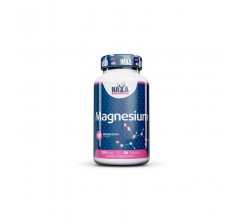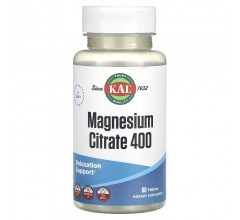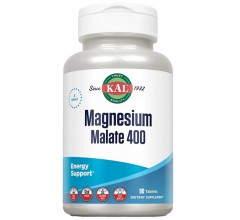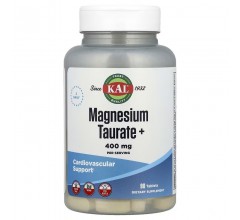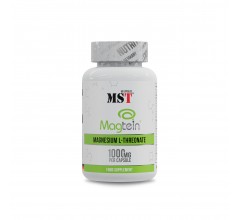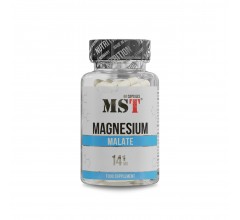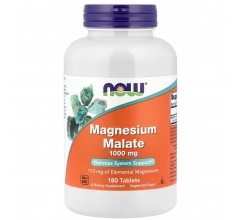- VIP: 1 563грн.
- GOLD: 1 614грн.
- SILVER: 1 648грн.
- VIP: 735грн.
- GOLD: 759грн.
- SILVER: 775грн.
- VIP: 2 069грн.
- GOLD: 2 137грн.
- SILVER: 2 182грн.
- VIP: 469грн.
- GOLD: 485грн.
- SILVER: 495грн.
- VIP: 725грн.
- GOLD: 749грн.
- SILVER: 764грн.
How important is magnesium for humans? Research shows that even a small amount of magnesium can reduce athletic performance . Despite the key role of magnesium in energy production, many trainers and athletes do not recognize its critical importance for maintaining health and performance. The consumption of magnesium in food has dropped to less than half of what was recorded 100 years ago and is still declining. However, many scientists believe that the amount of magnesium required for optimal health has been underestimated in the past, and new research suggests that even a small magnesium deficiency can seriously impair athletic performance.
About a quarter of magnesium is found in muscle tissue and three-fifths in bones; but less than 1% of it is found in blood serum. Serum magnesium can be divided into free ionic, complex-bound and protein-bound parts, but it is the ionic part that is considered the most important in measuring magnesium status, since it is physiologically active.
High levels of magnesium are found in unrefined whole grains, such as whole grain breads, as well as green leafy vegetables, nuts and seeds, peas, beans, and lentils (see table below). In f EBCCH, meat and fish, as well as refined foods is low in magnesium.
Contrary to popular belief, milk and dairy products are not particularly rich in magnesium. The magnesium content of plant foods generally reflects the magnesium concentration in the soil and the growing conditions.
| Table 1: Magnesium Content in Common Foods | |
| Pumpkin seeds (roasted) Almonds Brazil nuts Sesame seeds Peanuts (roasted, salted) Walnuts Rice (whole grain bread) Whole grain bread Spinach Boiled beans Broccoli Banana Potatoes (baked) White bread Yogurt (plain, low fat) Milk Rice (white) Cornflakes Honey Apple |
532 300 225 200 183 158 110 85 80 40 30 29 25 20 17 10 6 6 4 0.6 |
| A source; USDA Nutrient Database | |
The role of magnesium in the body
Magnesium plays a number of roles in the body and is required for more than 325 enzymatic reactions, including those involved in the synthesis of fat, protein and nucleic acids, neurological activity, muscle contraction and relaxation, heart function, and bone metabolism.
ATP metabolism
Even more important is the key role of magnesium in both anaerobic and aerobic energy production, especially in the metabolism of adenosine triphosphate (ATP), the “energy fuel” of the body.
For the synthesis of ATP, magnesium-dependent enzymes called "ATPases" are required. These enzymes have to work extremely hard: the average person can store no more than 3 ounces of ATP, however, during intense exercise, the ATP turnover rate is phenomenal: up to 15 kg of ATP per hour is broken down and reformed (from adenosine diphosphate and phosphate)!
Magnesium deficiency
In adults, magnesium deficiency leads to changes in cardiovascular function and an increase in blood pressure , impaired carbohydrate metabolism, insulin resistance, and decreased insulin secretion .
Disease conditions that have been associated with magnesium imbalance and deficiency include coronary artery disease, neuromuscular disorders, kidney disease, asthma , migraines, premenstrual syndrome, preeclampsia and eclampsia (both potentially serious complications of pregnancy), bone problems in menopause, and even obesity!
Recommended dosage of magnesium
The recommended dose of magnesium in the UK (the daily dose sufficient to prevent deficiency in 97.5% of the UK population) is set at 300 mg for men and 270 mg for women . The US recently revised its numbers upward and now recommends 400 mg per day for men aged 19-30 and 420 for those over 30; the figures for women under 30 and over are 300 and 310 mg per day, respectively . However, some researchers believe that they should be set even higher - 450-500 mg / day .
Conclusion
The researchers concluded, "That low dietary magnesium in the amounts consumed by some groups of physically active people reduces exercise performance." The mechanisms of this effect are unclear, but it is likely that magnesium deficiency can cause partial disconnection of the respiratory chain, increasing the amount of oxygen needed to support ATP production.
There is also evidence that magnesium deficiency increases energy expenditure and therefore oxygen consumption during exercise, as it reduces the effectiveness of muscle relaxation during exercise, which is an important part of total energy requirements during activities such as cycling .

